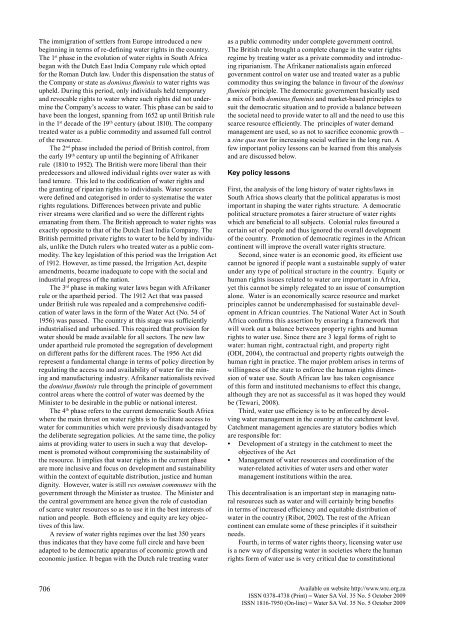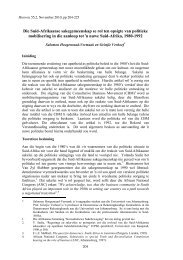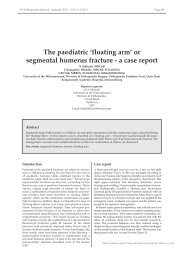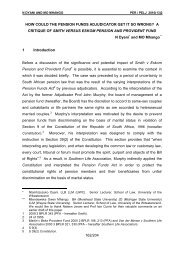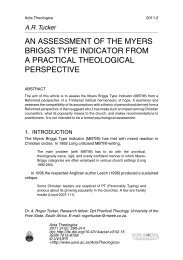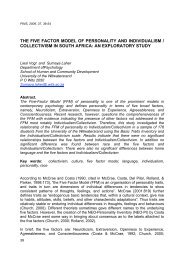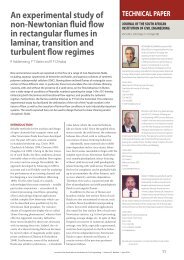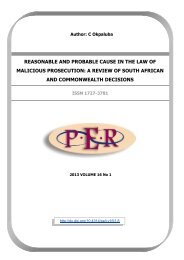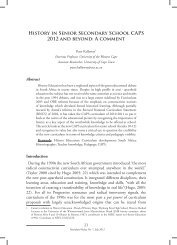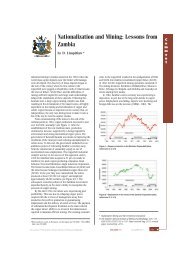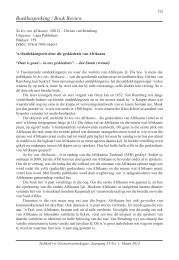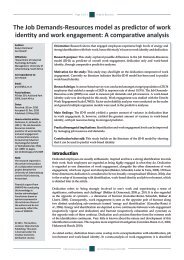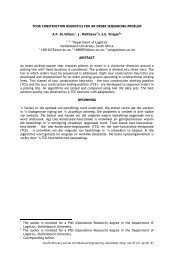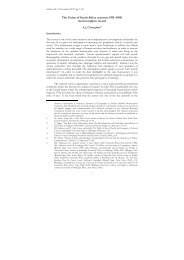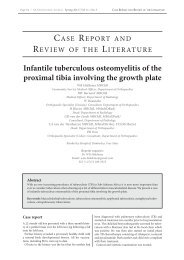A detailed analysis of evolution of water rights in South Africa: An ...
A detailed analysis of evolution of water rights in South Africa: An ...
A detailed analysis of evolution of water rights in South Africa: An ...
Create successful ePaper yourself
Turn your PDF publications into a flip-book with our unique Google optimized e-Paper software.
The immigration <strong>of</strong> settlers from Europe <strong>in</strong>troduced a new<br />
beg<strong>in</strong>n<strong>in</strong>g <strong>in</strong> terms <strong>of</strong> re-def<strong>in</strong><strong>in</strong>g <strong>water</strong> <strong>rights</strong> <strong>in</strong> the country.<br />
The 1 st phase <strong>in</strong> the <strong>evolution</strong> <strong>of</strong> <strong>water</strong> <strong>rights</strong> <strong>in</strong> <strong>South</strong> <strong>Africa</strong><br />
began with the Dutch East India Company rule which opted<br />
for the Roman Dutch law. Under this dispensation the status <strong>of</strong><br />
the Company or state as dom<strong>in</strong>us flum<strong>in</strong>is to <strong>water</strong> <strong>rights</strong> was<br />
upheld. Dur<strong>in</strong>g this period, only <strong>in</strong>dividuals held temporary<br />
and revocable <strong>rights</strong> to <strong>water</strong> where such <strong>rights</strong> did not underm<strong>in</strong>e<br />
the Company’s access to <strong>water</strong>. This phase can be said to<br />
have been the longest, spann<strong>in</strong>g from 1652 up until British rule<br />
<strong>in</strong> the 1 st decade <strong>of</strong> the 19 th century (about 1810). The company<br />
treated <strong>water</strong> as a public commodity and assumed full control<br />
<strong>of</strong> the resource.<br />
The 2 nd phase <strong>in</strong>cluded the period <strong>of</strong> British control, from<br />
the early 19 th century up until the beg<strong>in</strong>n<strong>in</strong>g <strong>of</strong> Afrikaner<br />
rule (1810 to 1952). The British were more liberal than their<br />
predecessors and allowed <strong>in</strong>dividual <strong>rights</strong> over <strong>water</strong> as with<br />
land tenure. This led to the codification <strong>of</strong> <strong>water</strong> <strong>rights</strong> and<br />
the grant<strong>in</strong>g <strong>of</strong> riparian <strong>rights</strong> to <strong>in</strong>dividuals. Water sources<br />
were def<strong>in</strong>ed and categorised <strong>in</strong> order to systematise the <strong>water</strong><br />
<strong>rights</strong> regulations. Differences between private and public<br />
river streams were clarified and so were the different <strong>rights</strong><br />
emanat<strong>in</strong>g from them. The British approach to <strong>water</strong> <strong>rights</strong> was<br />
exactly opposite to that <strong>of</strong> the Dutch East India Company. The<br />
British permitted private <strong>rights</strong> to <strong>water</strong> to be held by <strong>in</strong>dividuals,<br />
unlike the Dutch rulers who treated <strong>water</strong> as a public commodity.<br />
The key legislation <strong>of</strong> this period was the Irrigation Act<br />
<strong>of</strong> 1912. However, as time passed, the Irrigation Act, despite<br />
amendments, became <strong>in</strong>adequate to cope with the social and<br />
<strong>in</strong>dustrial progress <strong>of</strong> the nation.<br />
The 3 rd phase <strong>in</strong> mak<strong>in</strong>g <strong>water</strong> laws began with Afrikaner<br />
rule or the apartheid period. The 1912 Act that was passed<br />
under British rule was repealed and a comprehensive codification<br />
<strong>of</strong> <strong>water</strong> laws <strong>in</strong> the form <strong>of</strong> the Water Act (No. 54 <strong>of</strong><br />
1956) was passed. The country at this stage was sufficiently<br />
<strong>in</strong>dustrialised and urbanised. This required that provision for<br />
<strong>water</strong> should be made available for all sectors. The new law<br />
under apartheid rule promoted the segregation <strong>of</strong> development<br />
on different paths for the different races. The 1956 Act did<br />
represent a fundamental change <strong>in</strong> terms <strong>of</strong> policy direction by<br />
regulat<strong>in</strong>g the access to and availability <strong>of</strong> <strong>water</strong> for the m<strong>in</strong><strong>in</strong>g<br />
and manufactur<strong>in</strong>g <strong>in</strong>dustry. Afrikaner nationalists revived<br />
the dom<strong>in</strong>us flum<strong>in</strong>is rule through the pr<strong>in</strong>ciple <strong>of</strong> government<br />
control areas where the control <strong>of</strong> <strong>water</strong> was deemed by the<br />
M<strong>in</strong>ister to be desirable <strong>in</strong> the public or national <strong>in</strong>terest.<br />
The 4 th phase refers to the current democratic <strong>South</strong> <strong>Africa</strong><br />
where the ma<strong>in</strong> thrust on <strong>water</strong> <strong>rights</strong> is to facilitate access to<br />
<strong>water</strong> for communities which were previously disadvantaged by<br />
the deliberate segregation policies. At the same time, the policy<br />
aims at provid<strong>in</strong>g <strong>water</strong> to users <strong>in</strong> such a way that development<br />
is promoted without compromis<strong>in</strong>g the susta<strong>in</strong>ability <strong>of</strong><br />
the resource. It implies that <strong>water</strong> <strong>rights</strong> <strong>in</strong> the current phase<br />
are more <strong>in</strong>clusive and focus on development and susta<strong>in</strong>ability<br />
with<strong>in</strong> the context <strong>of</strong> equitable distribution, justice and human<br />
dignity. However, <strong>water</strong> is still res omnium communes with the<br />
government through the M<strong>in</strong>ister as trustee. The M<strong>in</strong>ister and<br />
the central government are hence given the role <strong>of</strong> custodian<br />
<strong>of</strong> scarce <strong>water</strong> resources so as to use it <strong>in</strong> the best <strong>in</strong>terests <strong>of</strong><br />
nation and people. Both efficiency and equity are key objectives<br />
<strong>of</strong> this law.<br />
A review <strong>of</strong> <strong>water</strong> <strong>rights</strong> regimes over the last 350 years<br />
thus <strong>in</strong>dicates that they have come full circle and have been<br />
adapted to be democratic apparatus <strong>of</strong> economic growth and<br />
economic justice. It began with the Dutch rule treat<strong>in</strong>g <strong>water</strong><br />
as a public commodity under complete government control.<br />
The British rule brought a complete change <strong>in</strong> the <strong>water</strong> <strong>rights</strong><br />
regime by treat<strong>in</strong>g <strong>water</strong> as a private commodity and <strong>in</strong>troduc<strong>in</strong>g<br />
riparianism. The Afrikaner nationalists aga<strong>in</strong> enforced<br />
government control on <strong>water</strong> use and treated <strong>water</strong> as a public<br />
commodity thus sw<strong>in</strong>g<strong>in</strong>g the balance <strong>in</strong> favour <strong>of</strong> the dom<strong>in</strong>us<br />
flum<strong>in</strong>is pr<strong>in</strong>ciple. The democratic government basically used<br />
a mix <strong>of</strong> both dom<strong>in</strong>us flum<strong>in</strong>is and market-based pr<strong>in</strong>ciples to<br />
suit the democratic situation and to provide a balance between<br />
the societal need to provide <strong>water</strong> to all and the need to use this<br />
scarce resource efficiently. The pr<strong>in</strong>ciples <strong>of</strong> <strong>water</strong> demand<br />
management are used, so as not to sacrifice economic growth –<br />
a s<strong>in</strong>e qua non for <strong>in</strong>creas<strong>in</strong>g social welfare <strong>in</strong> the long run. A<br />
few important policy lessons can be learned from this <strong>analysis</strong><br />
and are discussed below.<br />
Key policy lessons<br />
First, the <strong>analysis</strong> <strong>of</strong> the long history <strong>of</strong> <strong>water</strong> <strong>rights</strong>/laws <strong>in</strong><br />
<strong>South</strong> <strong>Africa</strong> shows clearly that the political apparatus is most<br />
important <strong>in</strong> shap<strong>in</strong>g the <strong>water</strong> <strong>rights</strong> structure. A democratic<br />
political structure promotes a fairer structure <strong>of</strong> <strong>water</strong> <strong>rights</strong><br />
which are beneficial to all subjects. Colonial rules favoured a<br />
certa<strong>in</strong> set <strong>of</strong> people and thus ignored the overall development<br />
<strong>of</strong> the country. Promotion <strong>of</strong> democratic regimes <strong>in</strong> the <strong>Africa</strong>n<br />
cont<strong>in</strong>ent will improve the overall <strong>water</strong> <strong>rights</strong> structure.<br />
Second, s<strong>in</strong>ce <strong>water</strong> is an economic good, its efficient use<br />
cannot be ignored if people want a susta<strong>in</strong>able supply <strong>of</strong> <strong>water</strong><br />
under any type <strong>of</strong> political structure <strong>in</strong> the country. Equity or<br />
human <strong>rights</strong> issues related to <strong>water</strong> are important <strong>in</strong> <strong>Africa</strong>,<br />
yet this cannot be simply relegated to an issue <strong>of</strong> consumption<br />
alone. Water is an economically scarce resource and market<br />
pr<strong>in</strong>ciples cannot be underemphasised for susta<strong>in</strong>able development<br />
<strong>in</strong> <strong>Africa</strong>n countries. The National Water Act <strong>in</strong> <strong>South</strong><br />
<strong>Africa</strong> confirms this assertion by ensur<strong>in</strong>g a framework that<br />
will work out a balance between property <strong>rights</strong> and human<br />
<strong>rights</strong> to <strong>water</strong> use. S<strong>in</strong>ce there are 3 legal forms <strong>of</strong> right to<br />
<strong>water</strong>: human right, contractual right, and property right<br />
(ODI, 2004), the contractual and property <strong>rights</strong> outweigh the<br />
human right <strong>in</strong> practice. The major problem arises <strong>in</strong> terms <strong>of</strong><br />
will<strong>in</strong>gness <strong>of</strong> the state to enforce the human <strong>rights</strong> dimension<br />
<strong>of</strong> <strong>water</strong> use. <strong>South</strong> <strong>Africa</strong>n law has taken cognisance<br />
<strong>of</strong> this form and <strong>in</strong>stituted mechanisms to effect this change,<br />
although they are not as successful as it was hoped they would<br />
be (Tewari, 2008).<br />
Third, <strong>water</strong> use efficiency is to be enforced by devolv<strong>in</strong>g<br />
<strong>water</strong> management <strong>in</strong> the country at the catchment level.<br />
Catchment management agencies are statutory bodies which<br />
are responsible for:<br />
• Development <strong>of</strong> a strategy <strong>in</strong> the catchment to meet the<br />
objectives <strong>of</strong> the Act<br />
• Management <strong>of</strong> <strong>water</strong> resources and coord<strong>in</strong>ation <strong>of</strong> the<br />
<strong>water</strong>-related activities <strong>of</strong> <strong>water</strong> users and other <strong>water</strong><br />
management <strong>in</strong>stitutions with<strong>in</strong> the area.<br />
This decentralisation is an important step <strong>in</strong> manag<strong>in</strong>g natural<br />
resources such as <strong>water</strong> and will certa<strong>in</strong>ly br<strong>in</strong>g benefits<br />
<strong>in</strong> terms <strong>of</strong> <strong>in</strong>creased efficiency and equitable distribution <strong>of</strong><br />
<strong>water</strong> <strong>in</strong> the country (Ribot, 2002). The rest <strong>of</strong> the <strong>Africa</strong>n<br />
cont<strong>in</strong>ent can emulate some <strong>of</strong> these pr<strong>in</strong>ciples if it suitstheir<br />
needs.<br />
Fourth, <strong>in</strong> terms <strong>of</strong> <strong>water</strong> <strong>rights</strong> theory, licens<strong>in</strong>g <strong>water</strong> use<br />
is a new way <strong>of</strong> dispens<strong>in</strong>g <strong>water</strong> <strong>in</strong> societies where the human<br />
<strong>rights</strong> form <strong>of</strong> <strong>water</strong> use is very critical due to constitutional<br />
706<br />
Available on website http://www.wrc.org.za<br />
ISSN 0378-4738 (Pr<strong>in</strong>t) = Water SA Vol. 35 No. 5 October 2009<br />
ISSN 1816-7950 (On-l<strong>in</strong>e) = Water SA Vol. 35 No. 5 October 2009


